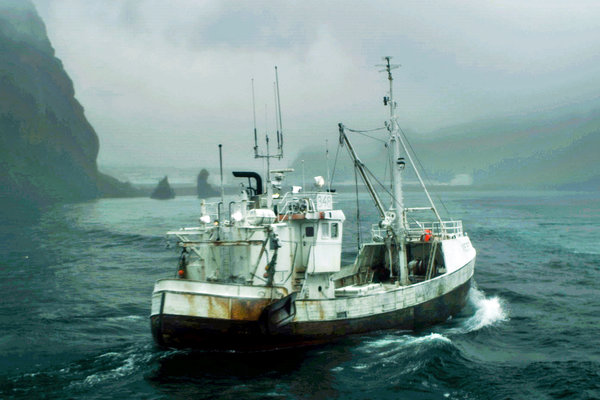Move over, Björk. With the blockbuster 2 Guns (Denzel Washington and Mark Wahlberg) set to explode across U.S. multiplexes this summer, renegade filmmaker Baltasar Kormakur (Contraband) is about to become Iceland's most popular cultural export. But first, the man once called the "Mayor of Reykjavik" has just released The Deep, an intimate, Icelandic film exploring survival, miracles and the perilous life of fishermen.

What constitutes a miracle?
This question runs through Icelandic director Baltasar Kormakur's most recent film, The Deep, which chronicles the life of Gulli (played pitch perfectly by Olafur Darri Olafsson), a simple man who survives a night in the frigid North Atlantic Ocean after his ship sinks.
The Deep is based on the true story of the trawler Breki that capsized in 1984 off the coast of Iceland's Westman Islands. Doctors speculated that Gulli, the lone survivor, stayed alive because he was, metaphorically, part seal due to his rotund frame being insulated by a remarkable amount of body fat. An object of fascination to Icelanders, Gulli quickly became a national icon and the subject of intense scientific investigation into why he didn't die.
In a nation where the economy is tied so heavily to the fishing industry, Gulli's miraculous story still resonates, even more so now that the country has been forced to redefine its cultural identity since the banking and finance industries precipitated Iceland's economic collapse in 2008.
"Bankers are not our heroes. They didn't give birth to our nation. Our fathers and grandfathers aren't businessmen," said Kormakur, currently in Los Angeles wrapping up post production on the blockbuster film 2 Guns.
"Our true heroes wear fishing gear and raincoats."
Observing his country transform from one rooted in the blue collar fishing industry to one dominated by runaway capitalism, Kormakur "felt we had lost our way, so I wanted to make a movie that reminded us of who we are."
Kormakur is at the top of his craft in The Deep. While it's easily his most contemplative movie, the director still brings his trademark grit and realism to the spiritual film, transporting audiences into the life of a rugged sailor and onto a fishing trawler plying some of the most dangerous seas in the world.
In all of his Icelandic films, (including the offbeat 101 Reykjavik and The Sea), Kormakur uses the harsh Icelandic landscape as a character. He doesn't fake it. In The Deep, he refused to use a tank for the water scenes, and blue screen was out of the question.
"Most films shot on water make the ocean look digital," Kormakur said. "In Titanic, the boat looked like it was sinking in a pond. Eighty percent of all Icelanders live by the sea. They know what the ocean looks like.
"We just had to get in there and do it."
Kormakur is drawn to films where characters "go through hell" and struggle, both emotionally and physically. But before sending his actors into the harsh sea, he took the plunge, swimming up to a rocky shore, waves crashing around him, making sure his filming locations were safe.
"If I could do it, I figured they could do it," said the award-winning director.
This is not the first time Kormakur has gotten his hands dirty (or wet) making a movie. In his second film, The Sea, shot during winter in the rugged East Fjords, the script called for a car to veer off a road, into the frigid bay. With cameras rolling, a hired stuntman drove a car into the water, but when it began sinking he panicked and couldn't escape. It was Kormakur who waded through the water and pulled the stuntman to safety.
Directing and producing The Deep was a test of Kormakur's stamina. They had to sink the boat, raise it and sink it again for a second take. And due to the ocean's current, Olafur kept drifting in and out of the frame, so the director was forced to tie a rope around himself, tether it to his actor and swim backwards to keep Olafur in the shot.
"There were challenges at every step," Kormakur said. "It was total madness, but we shot everything that we wanted. And you can't complain about being in the water, or complain that it's cold, because the real guy was in 40-degree water for six hours. At night."
The Deep could have easily turned into a melodramatic biopic, but Kormakur's raw, understated style allows the film to simply unfold on screen. He empowers the audience to decide for themselves whether Gulli's survival was a miracle, or a freak act of a man who stubbornly refused to die.
The director avoided what he calls "emotional porno" by tenderly training his camera on Olafur, granting the actor the emotional space with which to stoically explore complicated emotions like survivor's guilt, loss and sudden fame.
"Dead sailors are best kept in a watery grave," Gulli's father tells his son early in the film, while Gulli is recovering in a hospital. Later, when doctors are probing him, and his countrymen are fawning over him, Gulli must wonder if he, too, belongs amongst his dead friends who succumbed, like so many Icelandic fisherman before them, to the cold, dark sea.
"The ocean is like our war. We lose men to the sea, and this impacts Icelanders the same way it impacts other countries that lose people in war. Our fishermen risk their lives for the greater good, because this industry always keeps the country going," Kormakur said.
For Kormakur, and for his fellow Icelanders, The Deep was a film he had to make.
"Whenever someone is lost at sea, it captures the attention of the entire nation."
The Deep will be released in select U.S. theaters this summer and on digital platforms on May 21 via Focus World.
